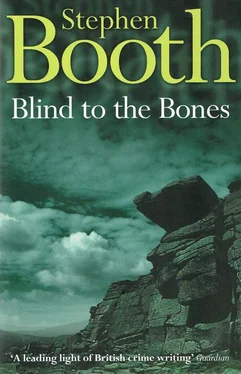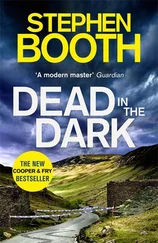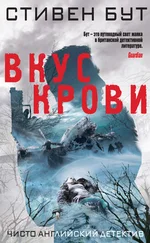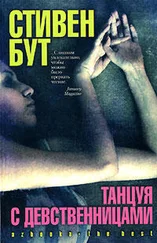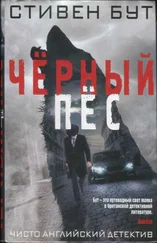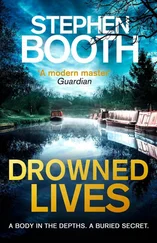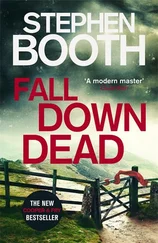There was a familiar face among the little crowd. Eric Oxley. He was the only adult member of the Oxley family here, though Cooper thought he had seen some of the children darting around, excited by what they had found waiting for them when they got home from school. Soon, the Yorkshire Traction bus driver would be doing extra business running tours to the scene. There were screens around the grave now, but a tent hadn’t been erected yet to protect the scene from the weather.
As Cooper approached, Eric Oxley seemed suddenly to remember their first meeting, when Cooper had been trying to find Shepley Head Lodge.
‘Shop!’ snorted Eric. ‘We’re bloody lucky we’ve got a pub.’
‘You’ve got a church too,’ pointed out Cooper.
‘Aye, there’s a church.’
‘The Reverend Alton says the congregations at St Asaph’s are very small, even when there are services here. I’d have thought the church would have been closed by now, to be honest.’
Oxley looked down the village at the church. ‘Everybody here thought they would have closed it, too,’ he said. ‘But that chap arrived, when we didn’t expect it.’
‘Mr Alton?’
‘Aye, Alton. Have you seen him, messing about in the graveyard?’
‘He’s trying to tidy it up, to improve the look of the place. He says nobody else will do it.’
‘Maybe not.’
‘He’s fighting a losing battle, Mr Oxley. He could do with some help.’
But Oxley just looked at him as if he were speaking a foreign language.
‘Have you done?’
‘I see your daughter-in-law has been working on the well dressing,’ said Cooper.
‘Aye. She does it every year. The younger ones help, too.’
‘Right.’ Cooper remembered the girls in the bath full of clay. ‘Puddling’, they called it — making the clay ready for spreading on the boards.
‘It’ll be up at the weekend,’ said Oxley.
‘But what about the other well? The one below the church. Why isn’t that one dressed as well?’
‘That well isn’t used. It hasn’t been used for a long time.’
‘But there’s water in it.’
‘I know that.’
‘So why isn’t it used?’
‘It’s on the wrong side of the church,’ said Oxley.
‘What do you mean, the wrong side?’
Eric Oxley shrugged. ‘People won’t use the water down that end. They say it’s polluted.’
‘But there are no farming activities at the end of the village. The farms are at the other end. Down there, there’s just the church and the graveyard, and the village hall.’
‘Like I said — people reckon it’s polluted.’
‘But what by?’
But Oxley either didn’t know the answer, or couldn’t be bothered to explain it. With a twitch of his shoulder, he began to walk off.
‘Mr Oxley,’ called Cooper.
‘Aye?’ said the old man, without looking round.
‘Those graves at the back of the church. Were those men some of the navvies working on the railway tunnels?’
‘Yes.’
‘I noticed that they all seem to have died around the same time. What did they die of?’
Oxley had stopped, but he still didn’t answer.
‘Was it an accident in the tunnels?’ said Cooper. ‘I thought perhaps it was a roof collapse, or an explosion, or something like that. But they died over a period of about a week. Was it an accident, Mr Oxley?’
‘Not really.’
Oxley turned back towards him at last. Cooper couldn’t see any expression in his eyes but for the usual suspicion. Oxley’s gaze slid past Cooper towards the graveyard itself, and to the neglected well, full of water that the villagers ignored. When he spoke, his voice was tinged not with suspicion, but with anger.
‘No, it wasn’t an accident that killed them.’
‘Not an accident? What, then?’
Oxley took a deep breath and met Cooper’s eyes at last when he spoke.
‘It was cholera.’
Suddenly, there was a scuffling and a shout from the churchyard gate, and two people burst through before anyone could stop them. They ran towards the tape, the man in the lead not bothering to stop as he charged into it and dragged it with him towards the makeshift grave. The Renshaws.
‘Stop them!’
The nearest scenes of crime officer was taken completely by surprise. He tried to turn, tripped on a clump of weeds and dropped his video camera. He began to swear as Howard Renshaw shouldered him aside and trampled into the middle of the sacrosanct crime scene, destroying evidence with every step.
Before anyone could get near him, Howard had dropped to his knees, plunged his hands into the tangled roots and peaty soil, and picked up the skull.
‘He had her here all the time,’ he said.
‘Mr Renshaw, please!’
Sarah was hanging back behind the cordon, not looking at the remains in the shallow grave, but staring at her husband as he ran his hands over the plates of the skull like a man caressing the head of a lover.
‘Emma,’ he said. ‘She liked me to dry her hair when she’d washed it. I can remember being able to feel her scalp move over her skull when I ran the towel through her hair. I know the feel of her skull.’
As a SOCO took hold of the skull and tried to gently prise it from his grip, Howard looked up and caught Fry’s eye. ‘And this is her skull. It’s my daughter.’
He resisted only a moment more, before allowing two police officers to pull him away.
Derek Alton sat awkwardly on his chair in the interview room at West Street. He was sweating, but then the room was always stuffy, and few interviewees found it comfortable. The interviewing officers tended to sweat, too. It didn’t make them guilty.
Alton was a fidgeter. Some people went very still, as if in shock; others insisted on getting up and pacing the room. There were some who appeared quite relaxed — but they were usually the regulars, who had been here and done it all before.
But Alton was a fidgeter. He sat, but not comfortably, shifting from one buttock to the other, edging his chair a little nearer to the table, then away again. His hands were constantly moving. He squeezed one with the fingers of the other, then turned both hands upside down and looked at his palms, as if surprised to see them. Or perhaps just surprised to see something that he could read there. Then Alton put his hands back flat on the table, hiding the palms. But his fingers were still moving. When he lifted his hands again, his fingertips left faint perspiration stains on the polished surface of the table.
Cooper watched him with fascination. These moments before the interview started were often the most important. The interviewee didn’t know what questions were going to be asked, and that allowed him to imagine the worst. If he had enough imagination, Alton might already have mentally painted himself into a corner, in a way that his interviewers were forbidden from doing. Just as they were obliged under the PACE rules to explain to him what his rights were, they also couldn’t tell him any untruths about what evidence they might have, or what other witnesses had said, or mislead him about what could happen to him. But Derek Alton could do all of that for himself, given time.
‘There’s nothing to worry about, Mr Alton,’ said Fry. ‘You’re here by your own free will to make a statement. You’re free to leave at any time. Do you understand?’
Alton nodded, but stared at her as if she had threatened him with impending doom and destruction.
‘Yes, I understand.’
Fry seemed to hear the same shake in his voice that Cooper did. ‘Are you quite comfortable, sir?’ she said. ‘Would you like a drink of water before we start? A cup of tea perhaps? Coffee?’
‘No, I’m fine. Thank you.’
Читать дальше
Конец ознакомительного отрывка
Купить книгу
